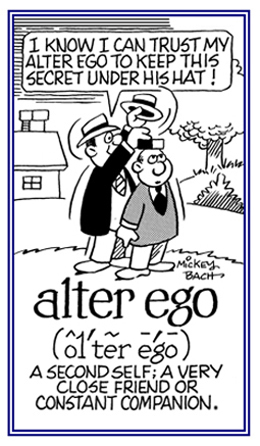1. Another side of oneself; a second self; or another aspect of one's self: The characters "Dr. Jekyll" and "Mr. Hyde" were alter egos in a literary tale of horror.
2. A very close and trusted friend who seems almost a part of someone's self: Leonard and Lance grew up together in the same neighborhood, went to the same elementary school, the same high school, and seemed to be alter egos among their friends at the college they both attended.
3. A second self; a perfect substitute or deputy: Jim's assistant manager acts as his alter ego when he is not in the office.
4. Etymology: from Latin alter, "other" + ego, "I, self".

© ALL rights are reserved.
Go to this Word A Day Revisited Index
2. A very close and trusted friend who seems almost a part of someone's self: Leonard and Lance grew up together in the same neighborhood, went to the same elementary school, the same high school, and seemed to be alter egos among their friends at the college they both attended.
3. A second self; a perfect substitute or deputy: Jim's assistant manager acts as his alter ego when he is not in the office.
4. Etymology: from Latin alter, "other" + ego, "I, self".

Go to this Word A Day Revisited Index
so you can see more of Mickey Bach's cartoons.
An identification with people who have a similar personality to one's own: Mrs. Adams read about alteregoism as being the interest and sympathy for those who are in the same situation as, or are otherwise, similar to one's self.
1. The self, especially as distinct from the world and other selves.
2. In psychoanalysis, the division of the psyche that is conscious, most immediately controls thought and behavior, and is most in touch with external reality: The ego is a part of the mind that senses and adapts to the real world.
3. An exaggerated sense of self-importance; conceit.
4. Appropriate pride in oneself; self-esteem.
5. Consciousness of one's own identity.
2. In psychoanalysis, the division of the psyche that is conscious, most immediately controls thought and behavior, and is most in touch with external reality: The ego is a part of the mind that senses and adapts to the real world.
3. An exaggerated sense of self-importance; conceit.
4. Appropriate pride in oneself; self-esteem.
5. Consciousness of one's own identity.
In psychoanalytic theory, the division of the psyche that is conscious, most immediately controls thought and behavior, and mediates between the person and external reality.
None are so empty as those who are full of themselves.
There’s only one thing that can keep growing without nourishment: the human ego.
Ego spem pretio non emo. (Latin statement)
Translation: "I don't buy hope for a price."
Written to currently mean: "Show me" or "I won't buy a pig in a poke (bag or sack)."
The ability to maintain various functions: The primary ego strength is to perceive reality and to adapt to it.
Ego sum rex Romanus (imperator Romanorum) et super grannaticam. (Latin statement)
Translation: "I am the king of Rome and above grammar."
Words spoken by the Holy Roman Emperor Sigismund at the Council of Constance (1414-1418) when a cardinal corrected his Latin.
1. A course of action or an experience that boosts someone's sense of his or her own importance.
2. An act, experience, or course of behavior that gratifies a person's self esteem.
3. Something that a person does to feel more important or better than other people: Joe is on a self-indulgent ego trip with his latest movie; which he wrote, directed, and starred in himself.
2. An act, experience, or course of behavior that gratifies a person's self esteem.
3. Something that a person does to feel more important or better than other people: Joe is on a self-indulgent ego trip with his latest movie; which he wrote, directed, and starred in himself.
egocentric (adjective), more egocentric, most egocentric
1. A reference to a person who holds the view that his or her self-esteem is the center, the object, and the norm of all experiences: An egocentric person can be very boring for other people to endure.
2. Relating to a focus on the attitude or interest to one's own needs or affairs and not to those of other people: Nancy was an egocentric woman who was selfish and, as a result, she never acknowledged that she was wrong about anything.
3. Descriptive of an extreme concentration of attention upon oneself; self-centered: Lester knew an egocentric and self-obsessed movie star.

© ALL rights are reserved.

© ALL rights are reserved.
Go to this Word A Day Revisited Index
2. Relating to a focus on the attitude or interest to one's own needs or affairs and not to those of other people: Nancy was an egocentric woman who was selfish and, as a result, she never acknowledged that she was wrong about anything.
3. Descriptive of an extreme concentration of attention upon oneself; self-centered: Lester knew an egocentric and self-obsessed movie star.
An egocentric is a person who has his I’s too close together.


Go to this Word A Day Revisited Index
so you can see more of Mickey Bach's cartoons.
Thinking only of oneself, without regard for the feelings or desires of others; self-centered.
Egocentricity is the vanity that makes you wonder what people are thinking about you when they are really wondering what you are thinking about them.
1. Regarding oneself and one's own opinions or interests as most important.
2. An attempt to get personal recognition for oneself; especially by unacceptable means.
2. An attempt to get personal recognition for oneself; especially by unacceptable means.
egodystonic (adjective), more egodystonic, most egodystonic
Pertaining to something repulsive or unacceptable to an individual's psychological condition or quality: An egodystonic situation refers to thoughts and behaviors; such as, dreams, impulses, compulsions, desires, etc. which are in conflict or unsuitable, with the needs and goals of a person's ideal situation.
The primary mental task of elderly people that is marked by a healthy and unifying experiences that they learned from experience: Those who have ego-integrity feel vital, balanced, and whole in relation to the self and to the world.
1. The ethical belief that self-interest is the just and proper motive for all human conduct: George's extreme egoism prevented him from thinking of anyone but himself.
2. Excessive preoccupation with one's own well-being and interests, usually accompanied by an inflated sense of self-importance: Egoism is an excessive high regard for oneself involving boasting that reveals a person's conceit that shuts out everyone else.
2. Excessive preoccupation with one's own well-being and interests, usually accompanied by an inflated sense of self-importance: Egoism is an excessive high regard for oneself involving boasting that reveals a person's conceit that shuts out everyone else.
Someone who is devoted to his or her own interests and advancements: The egoist is someone who is motivated by self-interests.
One nice thing about egotists:
They don't talk about other people.
They don't talk about other people.
1. An unhealthy over concern with oneself: People who are egomaniacs talk constantly about themselves or their own activities, to the exclusion of other people and everything else.
2. An extreme self-centeredness or self-appreciation: Egomania is not regarded as a mental disorder, but such extreme self-conceit is sometimes said to indicate an underlying mental instability.
2. An extreme self-centeredness or self-appreciation: Egomania is not regarded as a mental disorder, but such extreme self-conceit is sometimes said to indicate an underlying mental instability.

